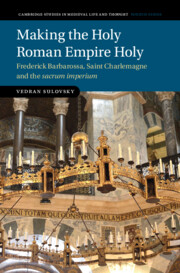 Making the Holy Roman Empire Holy
Making the Holy Roman Empire Holy Published online by Cambridge University Press: 16 May 2024
The penultimate chapter is about the reliquary shrine of Saint Charlemagne known as the Karlsschrein. It explores both the political and the religious significance of the monument and how the local convent, the city and the imperial court all participated in its making. By delving deep into the history of Aachen and its surrounding region, the ex-Kingdom of Lotharingia, Sulovsky shows how every single inconsistency was deliberately chosen to make a political or religious point. Thus, where previous scholars only focused on the major figures on the shrine, this book presents dozens of overlooked depictions both of symbolic animals and of humans, including representations of the local community. Moreover, where scholars struggled to find an exact purpose for the shrine’s appearance, the author makes it clear that the papal–imperial negotiations for the introduction of hereditary monarchy served as the foundation for the new vision of the Holy Roman Empire. Indeed, the Karlsschrein is shown to refer not only to Charlemagne’s foundation of the city and church of Aachen, and also of the Empire, but to the centuries-long papal–imperial alliance.
To save this book to your Kindle, first ensure [email protected] is added to your Approved Personal Document E-mail List under your Personal Document Settings on the Manage Your Content and Devices page of your Amazon account. Then enter the ‘name’ part of your Kindle email address below. Find out more about saving to your Kindle.
Note you can select to save to either the @free.kindle.com or @kindle.com variations. ‘@free.kindle.com’ emails are free but can only be saved to your device when it is connected to wi-fi. ‘@kindle.com’ emails can be delivered even when you are not connected to wi-fi, but note that service fees apply.
Find out more about the Kindle Personal Document Service.
To save content items to your account, please confirm that you agree to abide by our usage policies. If this is the first time you use this feature, you will be asked to authorise Cambridge Core to connect with your account. Find out more about saving content to Dropbox.
To save content items to your account, please confirm that you agree to abide by our usage policies. If this is the first time you use this feature, you will be asked to authorise Cambridge Core to connect with your account. Find out more about saving content to Google Drive.